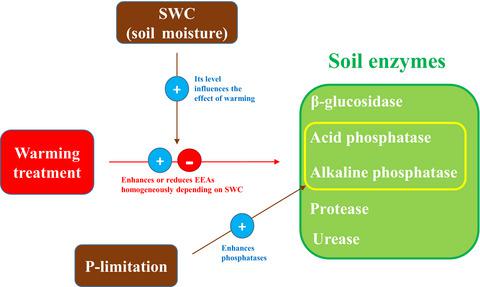当前位置:
X-MOL 学术
›
Glob. Change Biol.
›
论文详情
Our official English website, www.x-mol.net, welcomes your
feedback! (Note: you will need to create a separate account there.)
Effects of seasonal and decadal warming on soil enzymatic activity in a P-deficient Mediterranean shrubland.
Global Change Biology ( IF 10.8 ) Pub Date : 2020-04-23 , DOI: 10.1111/gcb.15077 Paolo Zuccarini 1, 2 , Dolores Asensio 1, 2 , Romà Ogaya 1, 2 , Jordi Sardans 1, 2 , Josep Peñuelas 1, 2
Global Change Biology ( IF 10.8 ) Pub Date : 2020-04-23 , DOI: 10.1111/gcb.15077 Paolo Zuccarini 1, 2 , Dolores Asensio 1, 2 , Romà Ogaya 1, 2 , Jordi Sardans 1, 2 , Josep Peñuelas 1, 2
Affiliation

|
Soil enzymes are central in the response of terrestrial ecosystems to climate change, and their study can be crucial for the models' implementation. We investigated for 1 year the effects of warming and seasonality on the potential activities of five soil extracellular enzymes and their relationships with soil moisture, phosphorus (P) concentration, and other soil parameters in a P-limited Mediterranean semiarid shrubland. The site was continuously subjected to warming since 1999, and we compared data from this study to analogous data from 2004. Warming uniformly increased all enzymes activities, but only when a sufficient amount of soil water was available. Seasonality unevenly altered enzyme activities, thus affecting enzymatic stoichiometry. P deficiency affected enzymatic stoichiometry, favoring the activities of the phosphatases. The effect of warming was stronger in 2014 than 2004, excluding the hypothesis of acclimation of rhizospheric responses to higher temperatures and suggesting that further increases in extracellular enzymatic activities are to be expected if sufficient water is available. Climatic warming will likely generally stimulate soil enzymatic activities and accelerate nutrient mineralization and similar ecological processes such as the production and degradation of biomass and changes in community composition, but which will be limited by water availability, especially in Mediterranean soils in summer. Winters in such ecosystems will benefit from a general increase in activity and production, but biological activity could even decrease in summer, potentially leading to a negative overall balance of nutrient mineralization. This study suggests that a general increase in activity due to warming could lead to faster mineralization of soil organic matter and water consumption in colder climates, until one of these factors in turn becomes limiting. Such trade-offs between water and temperature in relation with enzyme activity should be considered in biogeochemical models.
中文翻译:

季节性和年代际变暖对缺磷地中海灌丛土壤酶活性的影响。
土壤酶对于陆地生态系统对气候变化的响应至关重要,其研究对于模型的实施至关重要。我们调查了升温和季节性对五种土壤限制的地中海半干旱灌木丛中五种土壤细胞外酶的潜在活性及其与土壤水分,磷(P)浓度和其他土壤参数的关系的影响,为期一年。自1999年以来,该地点一直处于变暖状态,我们将这项研究的数据与2004年的类似数据进行了比较。变暖会均匀地增加所有酶的活性,但前提是要有足够的土壤水。季节性不均匀地改变酶的活性,从而影响酶的化学计量。磷缺乏影响酶的化学计量,有利于磷酸酶的活性。2014年,变暖的影响要强于2004年,但不包括根际对更高温度的反应适应的假说,并暗示如果有足够的水,则有望进一步提高细胞外酶的活性。气候变暖通常可能会刺激土壤酶的活动,并加速养分矿化和类似的生态过程,例如生物量的产生和降解以及群落组成的变化,但是这将受到水资源供应的限制,特别是在夏季的地中海土壤中。这种生态系统中的冬季将从活动和产量的普遍增长中受益,但夏季的生物活动甚至可能减少,有可能导致营养矿物质的总体负平衡。这项研究表明,由于气候变暖,活动的普遍增加可能导致较冷气候下土壤有机质的矿化速度加快和耗水量增加,直到这些因素之一变得有限为止。在生物地球化学模型中应考虑水和温度之间的这种折衷与酶活性之间的关系。
更新日期:2020-03-11
中文翻译:

季节性和年代际变暖对缺磷地中海灌丛土壤酶活性的影响。
土壤酶对于陆地生态系统对气候变化的响应至关重要,其研究对于模型的实施至关重要。我们调查了升温和季节性对五种土壤限制的地中海半干旱灌木丛中五种土壤细胞外酶的潜在活性及其与土壤水分,磷(P)浓度和其他土壤参数的关系的影响,为期一年。自1999年以来,该地点一直处于变暖状态,我们将这项研究的数据与2004年的类似数据进行了比较。变暖会均匀地增加所有酶的活性,但前提是要有足够的土壤水。季节性不均匀地改变酶的活性,从而影响酶的化学计量。磷缺乏影响酶的化学计量,有利于磷酸酶的活性。2014年,变暖的影响要强于2004年,但不包括根际对更高温度的反应适应的假说,并暗示如果有足够的水,则有望进一步提高细胞外酶的活性。气候变暖通常可能会刺激土壤酶的活动,并加速养分矿化和类似的生态过程,例如生物量的产生和降解以及群落组成的变化,但是这将受到水资源供应的限制,特别是在夏季的地中海土壤中。这种生态系统中的冬季将从活动和产量的普遍增长中受益,但夏季的生物活动甚至可能减少,有可能导致营养矿物质的总体负平衡。这项研究表明,由于气候变暖,活动的普遍增加可能导致较冷气候下土壤有机质的矿化速度加快和耗水量增加,直到这些因素之一变得有限为止。在生物地球化学模型中应考虑水和温度之间的这种折衷与酶活性之间的关系。











































 京公网安备 11010802027423号
京公网安备 11010802027423号